The Cambridge History of China. Vol. 12: Republican China, 1912-1949, Part 1
Подождите немного. Документ загружается.

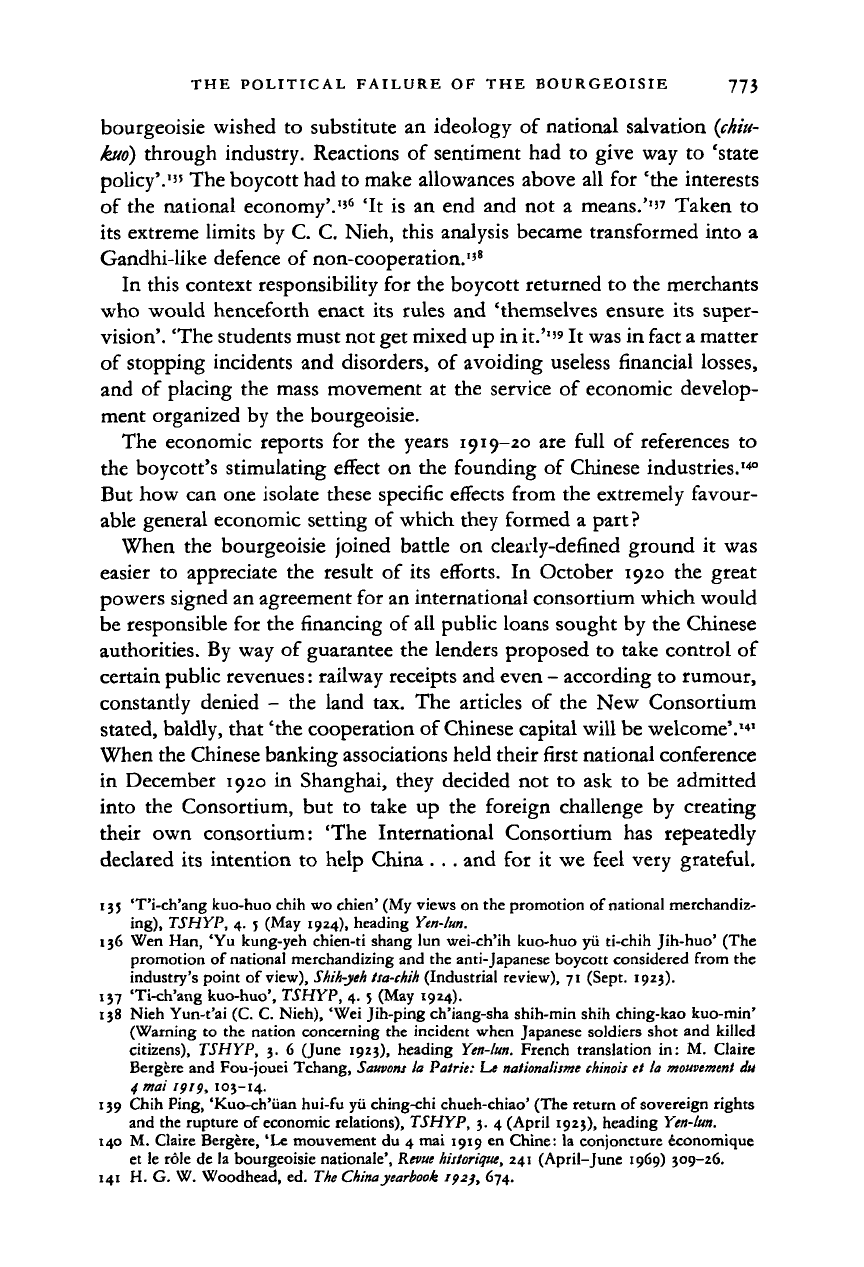
THE POLITICAL FAILURE OF THE BOURGEOISIE 773
bourgeoisie wished
to
substitute
an
ideology
of
national salvation
(chiu-
kuo) through industry. Reactions
of
sentiment
had
to
give
way
to
'state
policy'.
1
"
The
boycott
had to
make allowances above
all for 'the
interests
of
the
national economy'.
1
'
6
'It is
an end and not
a
means.'
1
'
7
Taken
to
its extreme limits
by C. C.
Nieh, this analysis became transformed into
a
Gandhi-like defence
of
non-cooperation.''
8
In this context responsibility
for the
boycott returned
to the
merchants
who would henceforth enact
its
rules
and
'themselves ensure
its
super-
vision'.
'The
students must
not get
mixed
up in
it.'
1
'
9
It
was
in
fact a matter
of stopping incidents
and
disorders,
of
avoiding useless financial losses,
and
of
placing
the
mass movement
at
the
service
of
economic develop-
ment organized
by the
bourgeoisie.
The economic reports
for
the
years 1919-20
are
full
of
references
to
the boycott's stimulating effect
on the
founding
of
Chinese industries.
140
But
how can one
isolate these specific effects from
the
extremely favour-
able general economic setting
of
which they formed
a
part
?
When
the
bourgeoisie joined battle
on
clearly-defined ground
it
was
easier
to
appreciate
the
result
of
its
efforts.
In
October
1920 the
great
powers signed
an
agreement
for an
international consortium which would
be responsible
for the
financing
of
all public loans sought
by the
Chinese
authorities.
By way of
guarantee
the
lenders proposed
to
take control
of
certain public revenues: railway receipts
and
even
-
according
to
rumour,
constantly denied
-
the
land
tax. The
articles
of
the New
Consortium
stated, baldly, that
'the
cooperation
of
Chinese capital will
be
welcome'.
141
When
the
Chinese banking associations held their first national conference
in December
1920
in
Shanghai, they decided
not
to
ask
to be
admitted
into
the
Consortium,
but to
take
up
the
foreign challenge
by
creating
their
own
consortium:
'The
International Consortium
has
repeatedly
declared
its
intention
to
help China
.
.
. and for
it
we
feel very grateful.
135 'T'i-ch'ang kuo-huo chih wo chien' (My views on the promotion of national merchandiz-
ing),
TSHYP, 4. 5 (May 1924), heading Yen-lun.
136 Wen Han,
'Yu
kung-yeh chien-ti shang lun wei-ch'ih kuo-huo
yii
ti-chih Jih-huo' (The
promotion
of
national merchandizing and the anti-Japanese boycott considered from the
industry's point
of
view),
Shih-yeh tsa-chih
(Industrial review), 71 (Sept. 1923).
137 'Ti-ch'ang kuo-huo', TSHYP, 4. 5 (May 1924).
138 Nieh Yun-t'ai (C.
C.
Nieh), 'Wei Jih-ping ch'iang-sha shih-min shih ching-kao kuo-min'
(Warning
to the
nation concerning the incident when Japanese soldiers shot and killed
citizens), TSHYP,
3. 6
(June 1923), heading Yen-lun. French translation
in: M.
Claire
Bergere and Fou-jouei Tchang,
Sauvons
la
Patrie:
Le
nationalisme chinois
et la
mouvement
du
4 mai 1919, 103-14.
139 Chih Ping, 'Kuo-ch'uan hui-fu yii ching-chi chueh-chiao' (The return
of
sovereign rights
and the rupture
of
economic relations), TSHYP,
3. 4
(April 1923), heading Yen-lun.
140 M. Claire Bergere, 'Le mouvement
du 4
mai 1919
en
Chine:
la
conjoncture economique
et
le
rdle
de la
bourgeoisie nationale',
Revue
hislorique,
241 (April-June 1969) 309-26.
141
H. G.
W. Woodhead, ed. The China
yearbook
192), 674.
Cambridge Histories Online © Cambridge University Press, 2008
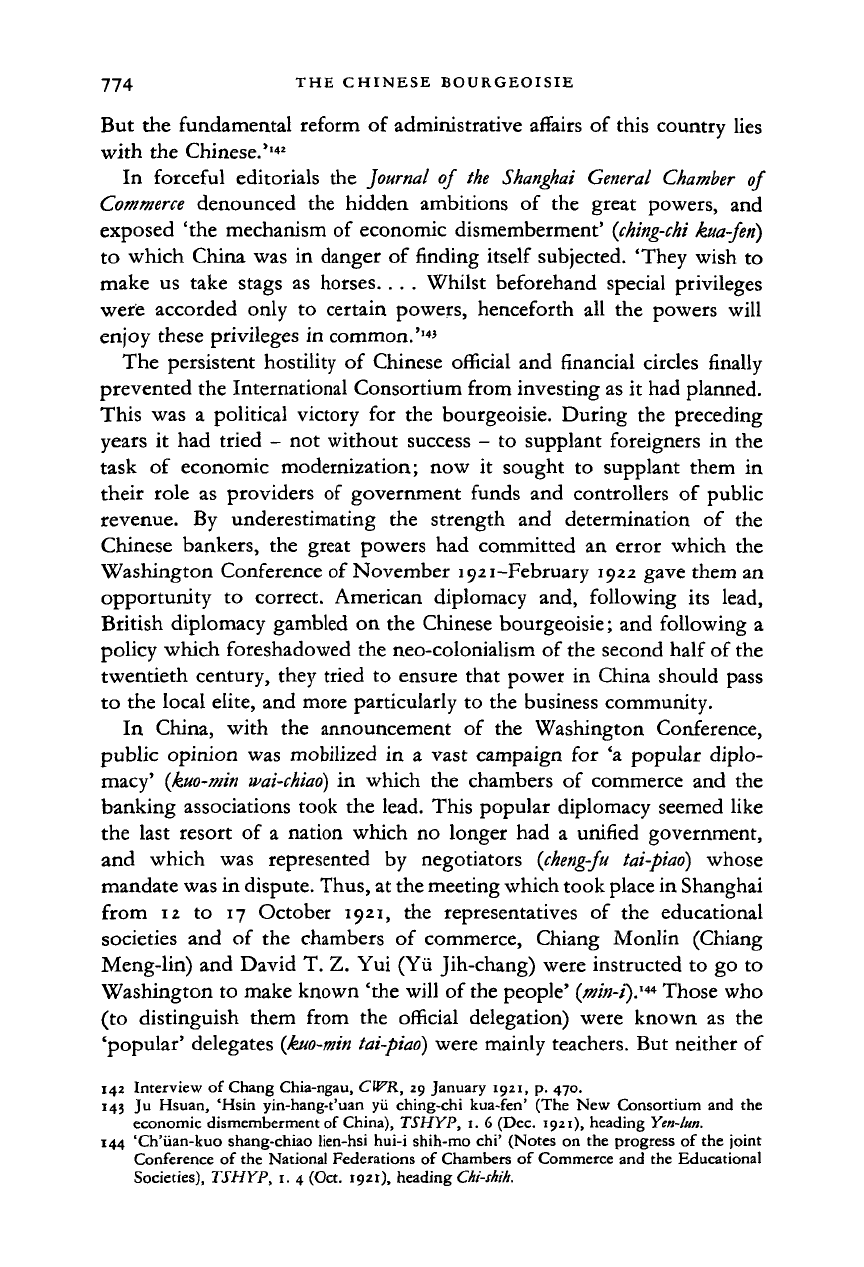
774 ™E CHINESE BOURGEOISIE
But
the
fundamental reform
of
administrative affairs
of
this country lies
with
the
Chinese.'
142
In forceful editorials
the
Journal
of
the
Shanghai General Chamber
of
Commerce
denounced
the
hidden ambitions
of
the
great powers,
and
exposed
'the
mechanism
of
economic dismemberment'
{ching-chi kua-fen)
to which China
was in
danger
of
finding itself subjected. 'They wish
to
make
us
take stags
as
horses.
. . .
Whilst beforehand special privileges
were accorded only
to
certain powers, henceforth
all
the
powers will
enjoy these privileges
in
common.'
143
The persistent hostility
of
Chinese official
and
financial circles finally
prevented
the
International Consortium from investing as
it had
planned.
This
was
a
political victory
for
the
bourgeoisie. During
the
preceding
years
it
had
tried
-
not
without success
- to
supplant foreigners
in the
task
of
economic modernization;
now
it
sought
to
supplant them
in
their role
as
providers
of
government funds
and
controllers
of
public
revenue.
By
underestimating
the
strength
and
determination
of the
Chinese bankers,
the
great powers
had
committed
an
error which
the
Washington Conference
of
November 1921-February 1922 gave them
an
opportunity
to
correct. American diplomacy
and,
following
its
lead,
British diplomacy gambled
on the
Chinese bourgeoisie;
and
following
a
policy which foreshadowed
the
neo-colonialism
of
the second half
of
the
twentieth century, they tried
to
ensure that power
in
China should pass
to
the
local elite,
and
more particularly
to the
business community.
In China, with
the
announcement
of
the
Washington Conference,
public opinion
was
mobilized
in a
vast campaign
for 'a
popular diplo-
macy' {kuo-min
wai-chiao)
in
which
the
chambers
of
commerce
and the
banking associations took
the
lead. This popular diplomacy seemed like
the last resort
of a
nation which
no
longer
had
a
unified government,
and which
was
represented
by
negotiators
{cheng-fu
tai-piao) whose
mandate was
in
dispute. Thus,
at
the meeting which took place in Shanghai
from
12 to 17
October
1921,
the
representatives
of
the
educational
societies
and
of
the
chambers
of
commerce, Chiang Monlin (Chiang
Meng-lin)
and
David
T. Z. Yui (Yii
Jih-chang) were instructed
to go
to
Washington
to
make known
'the
will
of
the people'
{min-i).
1
**
Those
who
(to distinguish them from
the
official delegation) were known
as the
'popular' delegates
{kuo-min tai-piao)
were mainly teachers.
But
neither
of
142 Interview
of
Chang Chia-ngau, CWK, 29 January 1921, p. 470.
143
Ju
Hsuan, 'Hsin yin-hang-t'uan
yii
ching-chi kua-fen' (The New Consortium
and the
economic dismemberment of China), TSHYP, 1.
6
(Dec. 1921), heading
Yen-lun.
144 'Ch'iian-kuo shang-chiao lien-hsi hui-i shih-mo chi' (Notes
on
the progress
of
the joint
Conference
of
the National Federations
of
Chambers
of
Commerce and the Educational
Societies), TSHYP, 1.
4
(Oct. 1921), heading
Chi-shih.
Cambridge Histories Online © Cambridge University Press, 2008
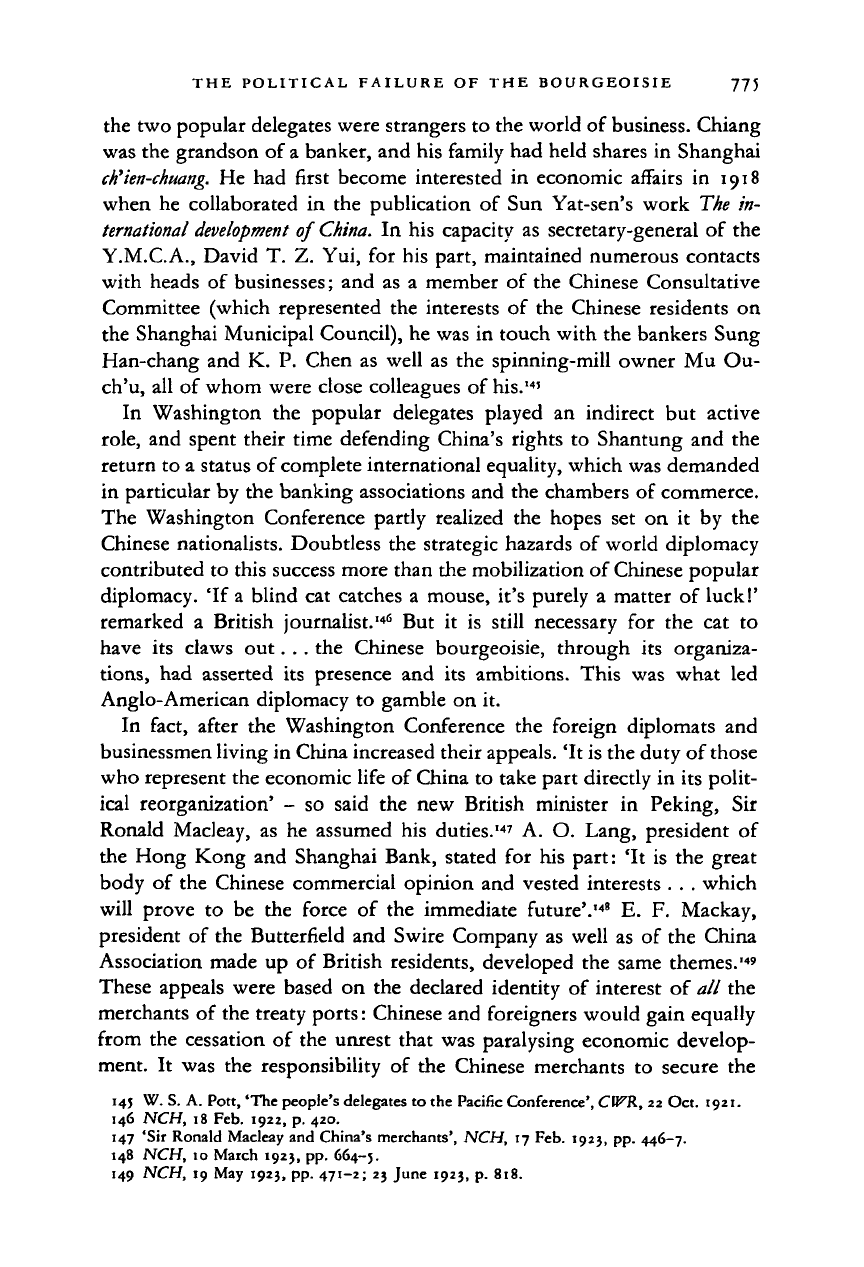
THE POLITICAL FAILURE OF THE BOURGEOISIE 775
the two popular delegates were strangers
to
the world
of
business. Chiang
was the grandson
of
a banker,
and
his family
had
held shares
in
Shanghai
ch'ien-chuang.
He had
first become interested
in
economic affairs
in 1918
when
he
collaborated
in the
publication
of Sun
Yat-sen's work The
in-
ternational development
of
China.
In his
capacity
as
secretary-general
of the
Y.M.C.A., David
T. Z.
Yui,
for his
part, maintained numerous contacts
with heads
of
businesses;
and as a
member
of
the Chinese Consultative
Committee (which represented
the
interests
of the
Chinese residents
on
the Shanghai Municipal Council),
he
was
in
touch with the bankers Sung
Han-chang
and K. P.
Chen
as
well
as the
spinning-mill owner
Mu Ou-
ch'u,
all of
whom were close colleagues
of
his.
14
'
In Washington
the
popular delegates played
an
indirect
but
active
role,
and
spent their time defending China's rights
to
Shantung
and the
return to
a
status
of
complete international equality, which was demanded
in particular
by
the banking associations
and the
chambers
of
commerce.
The Washington Conference partly realized
the
hopes
set on it by the
Chinese nationalists. Doubtless
the
strategic hazards
of
world diplomacy
contributed
to
this success more than the mobilization
of
Chinese popular
diplomacy.
'If
a blind
cat
catches
a
mouse,
it's
purely
a
matter
of
luck!'
remarked
a
British journalist.'
46
But it is
still necessary
for the cat to
have
its
claws
out. . . the
Chinese bourgeoisie, through
its
organiza-
tions,
had
asserted
its
presence
and its
ambitions. This
was
what
led
Anglo-American diplomacy
to
gamble
on it.
In fact, after
the
Washington Conference
the
foreign diplomats
and
businessmen living in China increased their appeals.
'It
is the duty
of
those
who represent the economic life
of
China
to
take part directly
in its
polit-
ical reorganization'
- so
said
the new
British minister
in
Peking,
Sir
Ronald Macleay,
as he
assumed
his
duties.
147
A. O.
Lang, president
of
the Hong Kong
and
Shanghai Bank, stated
for his
part:
'It is the
great
body
of the
Chinese commercial opinion
and
vested interests
. . .
which
will prove
to be the
force
of the
immediate future'.
148
E. F.
Mackay,
president
of
the Butterfield
and
Swire Company
as
well
as of
the China
Association made
up of
British residents, developed
the
same themes.'
49
These appeals were based
on the
declared identity
of
interest
of all the
merchants
of
the treaty ports: Chinese and foreigners would gain equally
from
the
cessation
of
the unrest that
was
paralysing economic develop-
ment.
It was the
responsibility
of the
Chinese merchants
to
secure
the
145
W. S. A.
Pott, 'The people's delegates
to
the Pacific Conference',
CWK, 22
Oct.
1921.
146
NCH, 18
Feb. 1922, p. 420.
147
'Sir
Ronald Macleay and China's merchants',
NCH, 17
Feb. 1923, pp. 446-7.
148
NCH, 10
March 1923, pp. 664-5.
149
NCH, 19 May
1923, pp. 471-2;
23
June 1923,
p. 818.
Cambridge Histories Online © Cambridge University Press, 2008
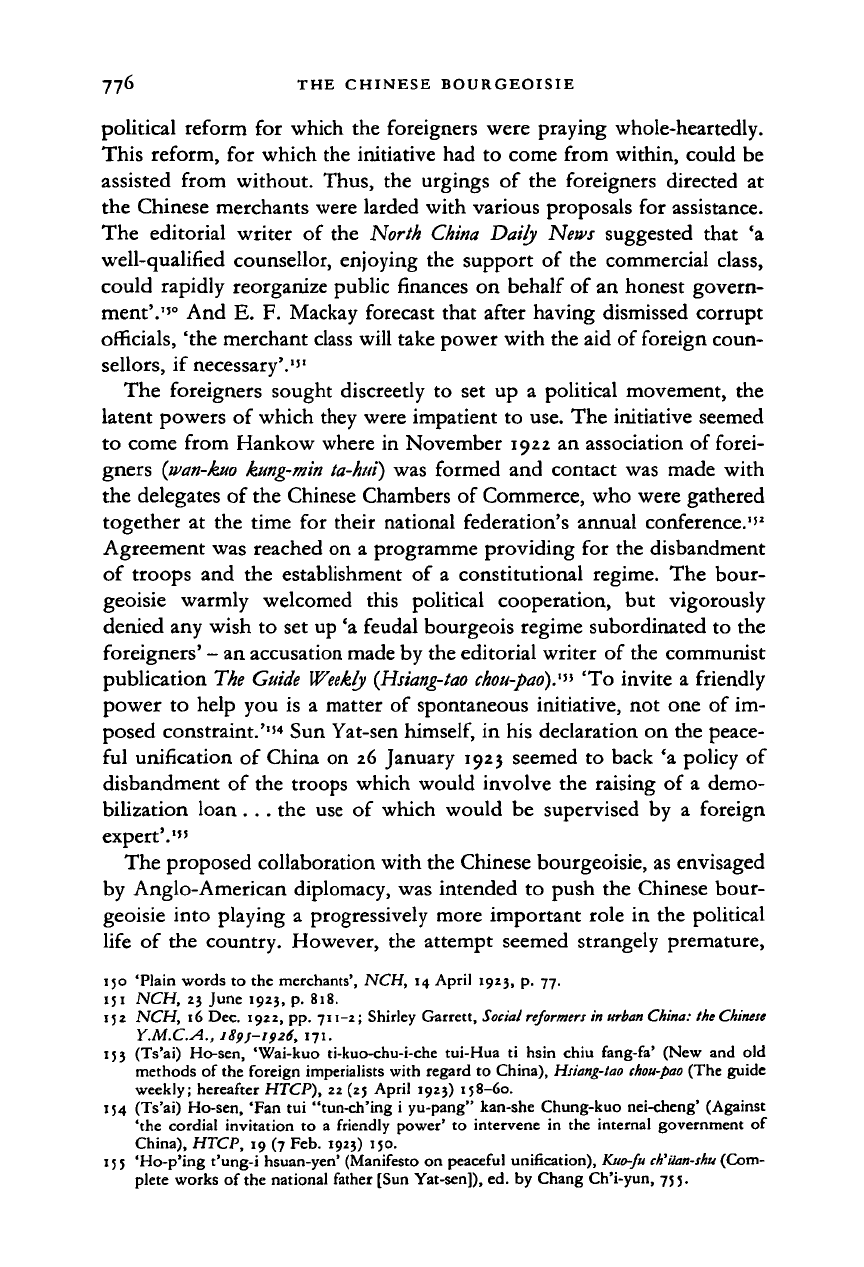
776 THE CHINESE BOURGEOISIE
political reform for which the foreigners were praying whole-heartedly.
This reform, for which the initiative had to come from within, could be
assisted from without. Thus, the urgings of the foreigners directed at
the Chinese merchants were larded with various proposals for assistance.
The editorial writer of the North China Daily News suggested that 'a
well-qualified counsellor, enjoying the support of the commercial class,
could rapidly reorganize public finances on behalf of an honest govern-
ment'.''° And E. F. Mackay forecast that after having dismissed corrupt
officials, 'the merchant class will take power with the aid of foreign coun-
sellors, if necessary'.
1
'
1
The foreigners sought discreetly to set up a political movement, the
latent powers of which they were impatient to use. The initiative seemed
to come from Hankow where in November 1922 an association of forei-
gners
(wan-kuo kung-min ta-hui)
was formed and contact was made with
the delegates of the Chinese Chambers of Commerce, who were gathered
together at the time for their national federation's annual conference.
1
'
2
Agreement was reached on a programme providing for the disbandment
of troops and the establishment of a constitutional regime. The bour-
geoisie warmly welcomed this political cooperation, but vigorously
denied any wish to set up 'a feudal bourgeois regime subordinated to the
foreigners'
—
an accusation made by the editorial writer of the communist
publication The Guide Weekly {Hsiang-tao chou-pao).
1
" 'To invite a friendly
power to help you is a matter of spontaneous initiative, not one of im-
posed constraint.'"
4
Sun Yat-sen
himself,
in his declaration on the peace-
ful unification of China on 26 January 1923 seemed to back 'a policy of
disbandment of the troops which would involve the raising of a demo-
bilization loan . . . the use of which would be supervised by a foreign
expert'.
1
"
The proposed collaboration with the Chinese bourgeoisie, as envisaged
by Anglo-American diplomacy, was intended to push the Chinese bour-
geoisie into playing a progressively more important role in the political
life of the country. However, the attempt seemed strangely premature,
150 'Plain words to the merchants', NCH, 14 April 1923, p. 77.
151 NCH, 23 June 1923, p. 818.
152 NCH, 16 Dec. 1922, pp. 711-2; Shirley Garrett, Social
reformers
in
urban
China:
theChinese
Y.M.C.A., 189J-1926, 171.
153 (Ts'ai) Ho-sen, 'Wai-kuo ti-kuo-chu-i-che tui-Hua ti hsin chiu fang-fa' (New and old
methods of the foreign imperialists with regard to China), Hsiang-tao
chou-pao
(The guide
weekly; hereafter HTCP), 22 (25 April 1923) 158-60.
154 (Ts'ai) Ho-sen, 'Fan tui "tun-ch'ing i yu-pang" kan-she Chung-kuo nei-cheng' (Against
'the cordial invitation to a friendly power' to intervene in the internal government of
China), HTCP, 19 (7 Feb. 1923) 150.
155 'Ho-p'ing t'ung-i hsuan-yen' (Manifesto on peaceful unification),
Kuo-fu ch'Oan-shu
(Com-
plete works of the national father [Sun Yat-sen]), ed. by Chang Ch'i-yun, 755.
Cambridge Histories Online © Cambridge University Press, 2008
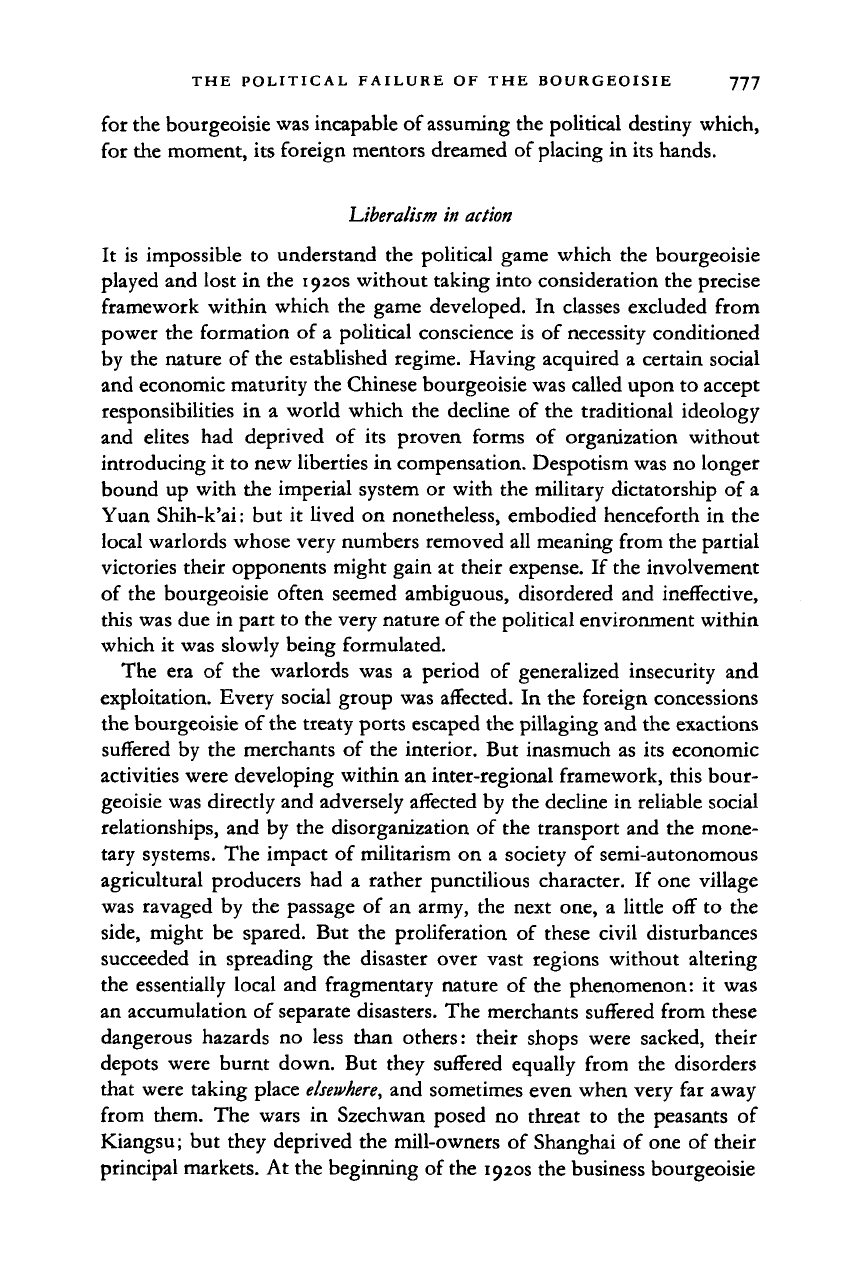
THE POLITICAL FAILURE OF THE BOURGEOISIE 777
for the bourgeoisie was incapable of assuming the political destiny which,
for the moment, its foreign mentors dreamed of placing in its hands.
Liberalism in action
It is impossible to understand the political game which the bourgeoisie
played and lost in the 1920s without taking into consideration the precise
framework within which the game developed. In classes excluded from
power the formation of a political conscience is of necessity conditioned
by the nature of the established regime. Having acquired a certain social
and economic maturity the Chinese bourgeoisie was called upon to accept
responsibilities in a world which the decline of the traditional ideology
and elites had deprived of its proven forms of organization without
introducing it to new liberties in compensation. Despotism was no longer
bound up with the imperial system or with the military dictatorship of a
Yuan Shih-k'ai: but it lived on nonetheless, embodied henceforth in the
local warlords whose very numbers removed all meaning from the partial
victories their opponents might gain at their expense. If the involvement
of the bourgeoisie often seemed ambiguous, disordered and ineffective,
this was due in part to the very nature of the political environment within
which it was slowly being formulated.
The era of the warlords was a period of generalized insecurity and
exploitation. Every social group was affected. In the foreign concessions
the bourgeoisie of the treaty ports escaped the pillaging and the exactions
suffered by the merchants of the interior. But inasmuch as its economic
activities were developing within an inter-regional framework, this bour-
geoisie was directly and adversely affected by the decline in reliable social
relationships, and by the disorganization of the transport and the mone-
tary systems. The impact of militarism on a society of semi-autonomous
agricultural producers had a rather punctilious character. If one village
was ravaged by the passage of an army, the next one, a little off to the
side,
might be spared. But the proliferation of these civil disturbances
succeeded in spreading the disaster over vast regions without altering
the essentially local and fragmentary nature of the phenomenon: it was
an accumulation of separate disasters. The merchants suffered from these
dangerous hazards no less than others: their shops were sacked, their
depots were burnt down. But they suffered equally from the disorders
that were taking place
elsewhere,
and sometimes even when very far away
from them. The wars in Szechwan posed no threat to the peasants of
Kiangsu; but they deprived the mill-owners of Shanghai of one of their
principal markets. At the beginning of the 1920s the business bourgeoisie
Cambridge Histories Online © Cambridge University Press, 2008
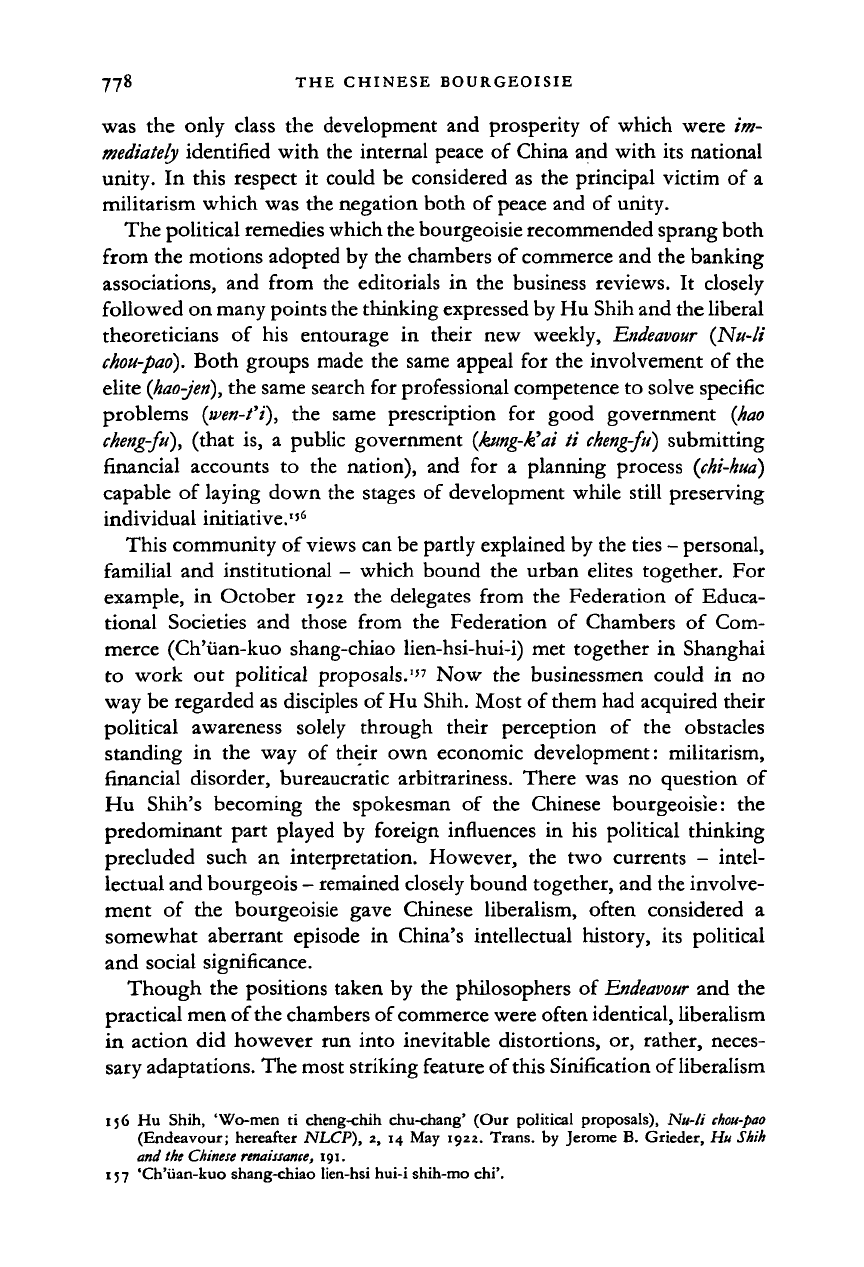
778 THE CHINESE BOURGEOISIE
was the only class the development and prosperity of which were im-
mediately
identified with the internal peace of China and with its national
unity. In this respect it could be considered as the principal victim of a
militarism which was the negation both of peace and of unity.
The political remedies which the bourgeoisie recommended sprang both
from the motions adopted by the chambers of commerce and the banking
associations, and from the editorials in the business reviews. It closely
followed on many points the thinking expressed by Hu Shih and the liberal
theoreticians of his entourage in their new weekly,
Endeavour
(Nu-/i
chou-pao).
Both groups made the same appeal for the involvement of the
elite
{hao-jen),
the same search for professional competence to solve specific
problems (wen-t'i), the same prescription for good government (hao
cheng-fu),
(that is, a public government (knng-k'ai ti
cheng-fu)
submitting
financial accounts to the nation), and for a planning process
(chi-hua)
capable of laying down the stages of development while still preserving
individual initiative.
1
'
6
This community of
views
can be partly explained by the ties - personal,
familial and institutional - which bound the urban elites together. For
example, in October 1922 the delegates from the Federation of Educa-
tional Societies and those from the Federation of Chambers of Com-
merce (Ch'uan-kuo shang-chiao lien-hsi-hui-i) met together in Shanghai
to work out political proposals.
1
'
7
Now the businessmen could in no
way be regarded as disciples of Hu Shih. Most of them had acquired their
political awareness solely through their perception of the obstacles
standing in the way of their own economic development: militarism,
financial disorder, bureaucratic arbitrariness. There was no question of
Hu Shih's becoming the spokesman of the Chinese bourgeoisie: the
predominant part played by foreign influences in his political thinking
precluded such an interpretation. However, the two currents - intel-
lectual and bourgeois - remained closely bound together, and the involve-
ment of the bourgeoisie gave Chinese liberalism, often considered a
somewhat aberrant episode in China's intellectual history, its political
and social significance.
Though the positions taken by the philosophers of
TLndeavour
and the
practical men of the chambers of commerce were often identical, liberalism
in action did however run into inevitable distortions, or, rather, neces-
sary adaptations. The most striking feature of this Sinification of liberalism
156 Hu Shih, 'Women ti cheng-chih chu-chang' (Our political proposals), Nu-/i
chou-pao
(Endeavour; hereafter NLCP), 2, 14 May 1922. Trans, by Jerome B. Grieder, Hu Shih
and
the Chinese
renaissance,
191.
157 'Ch'iian-kuo shang-chiao lien-hsi hui-i shih-mo chi'.
Cambridge Histories Online © Cambridge University Press, 2008
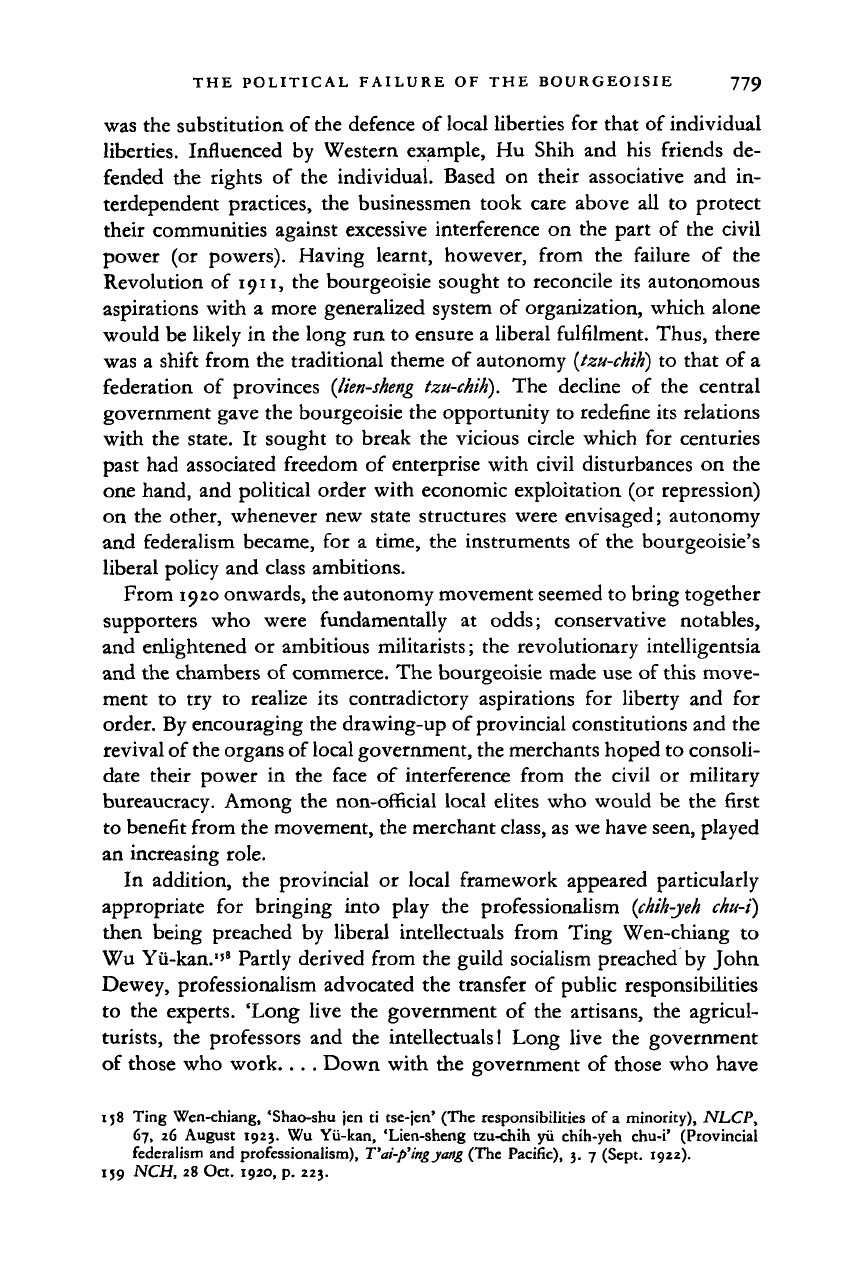
THE POLITICAL FAILURE OF THE BOURGEOISIE 779
was the substitution of the defence of local liberties for that of individual
liberties. Influenced by Western example, Hu Shih and his friends de-
fended the rights of the individual. Based on their associative and in-
terdependent practices, the businessmen took care above all to protect
their communities against excessive interference on the part of the civil
power (or powers). Having learnt, however, from the failure of the
Revolution of 1911, the bourgeoisie sought to reconcile its autonomous
aspirations with a more generalized system of organization, which alone
would be likely in the long run to ensure a liberal fulfilment. Thus, there
was a shift from the traditional theme of autonomy
{tzu-chih)
to that of a
federation of provinces
{lien-sheng
tzu-ckih). The decline of the central
government gave the bourgeoisie the opportunity to redefine its relations
with the state. It sought to break the vicious circle which for centuries
past had associated freedom of enterprise with civil disturbances on the
one hand, and political order with economic exploitation (or repression)
on the other, whenever new state structures were envisaged; autonomy
and federalism became, for a time, the instruments of the bourgeoisie's
liberal policy and class ambitions.
From 1920 onwards, the autonomy movement seemed to bring together
supporters who were fundamentally at odds; conservative notables,
and enlightened or ambitious militarists; the revolutionary intelligentsia
and the chambers of commerce. The bourgeoisie made use of this move-
ment to try to realize its contradictory aspirations for liberty and for
order. By encouraging the drawing-up of provincial constitutions and the
revival of the organs of local government, the merchants hoped to consoli-
date their power in the face of interference from the civil or military
bureaucracy. Among the non-official local elites who would be the first
to benefit from the movement, the merchant class, as we have seen, played
an increasing role.
In addition, the provincial or local framework appeared particularly
appropriate for bringing into play the professionalism
{chih-jeh
chu-i)
then being preached by liberal intellectuals from Ting Wen-chiang to
Wu Yii-kan.
1
'
8
Partly derived from the guild socialism preached by John
Dewey, professionalism advocated the transfer of public responsibilities
to the experts. 'Long live the government of the artisans, the agricul-
turists, the professors and the intellectuals! Long live the government
of those who work. .. . Down with the government of those who have
158 Ting Wen-chiang, 'Shao-shu jen ti tse-jen' (The responsibilities of a minority), NLCP,
67,
26 August 1923. Wu Yii-kan, 'Lien-sheng tzu-chih yii chih-yeh chu-i' (Provincial
federalism and professionalism), T'ai-p'ingyang (The Pacific), 3. 7 (Sept. 1922).
159 NCH, 28 Oct. 1920, p. 223.
Cambridge Histories Online © Cambridge University Press, 2008

780 THE CHINESE BOURGEOISIE
nothing else
to
do!'
1
" Repeated
in
frankly polemic fashion
by the mon-
thly journal
of
the
Shanghai General Chamber
of
Commerce,
the
theme
became that
of
government
by
professionals
{chih-jeh
cheng-chih):
all
non-professionals (wu
chih-yeh che)
were
to
be
deprived
of
civil rights
-
that
is,
'the
aristocrats,
the
militarists,
the
bureaucrats
and
the
politi-
cians'.
160
Without going
as far
as that, most
of
the proposals
for
provincial cons-
titutions reserved special representation
for
professional interests,
and
handed over very broad economic powers
to
local authorities:
for
ex-
ample, management
of
the railways, telephones
and
telegraphs, founding
of note-issuing banks.
l6
'
Through autonomy
the
bourgeoisie
was not
only seeking
to
ensure
its emancipation from
the
bureaucracy:
it
was
also attempting
to
estab-
lish,
in its
own
interests,
an
effective system
of
social control. Recent
studies have emphasized
the
concomitance between
the
development
of the organs
of
self-government
and
that
of
systems
of
fiscal
levy
of
the
li-chia
type,
or
security organizations
of
the
pao-chia
type.'
62
The
growth
of merchant militia
at
the
beginning
of
the
1920s bears witness
to
this
same solicitude
on the
part
of
business circles
to
take charge
of
the
maintenance
of
order.
In
1916
the
organization
of
these militia
had
been
strictly regulated. This came about as
a
result
of
Yuan Shih-k'ai's dissolu-
tion
of
the
district assemblies
in
1914,
which represented
an
offensive
return
of
bureaucracy. With
the
development
of the
movement
for
autonomy,
the
merchants demanded that this control
be
relaxed.
'We
ask
the
government
to
allow every chamber
of
commerce
to
train its
own
militia
to
ensure
its
self-defence.''
6
' Quoting
the
precedent
of
the Han-
seatic League,
the
Hankow Chamber
of
Commerce even demanded
the
creation
of
a
genuine League
of
Cities.
'If
throughout
the
whole
of
the
country
the
cities succeed
in
establishing
a
real union,
our
power will
be immense.'
164
160 (Teng) Chih-ping "Shih-chu tsa-lcan' (Various impressions
of the
current situation),
TSHYP,
3.
2 (Feb. 1923), heading
Yen-lun.
161 Sie
Ying-chow,
-Le
federalisme
en
Chine.
(Ltudes
sur
quelques constitutions
provinciates,
83, 204.
162 Philip
A.
Kuhn, 'Local self-government under
the
republic: problems
of
control,
au-
tonomy
and
mobilization',
in
Frederic Wakeman,
Jr.
and
Carolyn Grant,
eds.
Conflict
and
control
in late imperial
China,
257-98.
163
'
"Ch'ing ho-ch'eng cheng-fu t'e-hsu ch'iian-kuo shang-hui tzu-lien shang-t'uan
an":
Ssu-ch'uan Ch'eng-tu tsung-shang-hui tai-piao t'i-i,' ('That
a
common approach be made
to the government requesting that Chambers
of
Commerce be specially authorized to train
merchant militia'. Motion put forward by the General Chamber of Commerce of Chengtu,
Szechwan), TSHYP, 3.
4
(April 1923).
164 'Pao-hu shang-pu an-ch'iian
i-an,
Han-k'ou tsung-shang-hui t'i-i' (Proposal concerning
the protection
of
commercial centres. Motion
put
forward
by the
General Chamber
of
Commerce
of
Hankow), TSHYP, 3. 5 (May 1923).
Cambridge Histories Online © Cambridge University Press, 2008
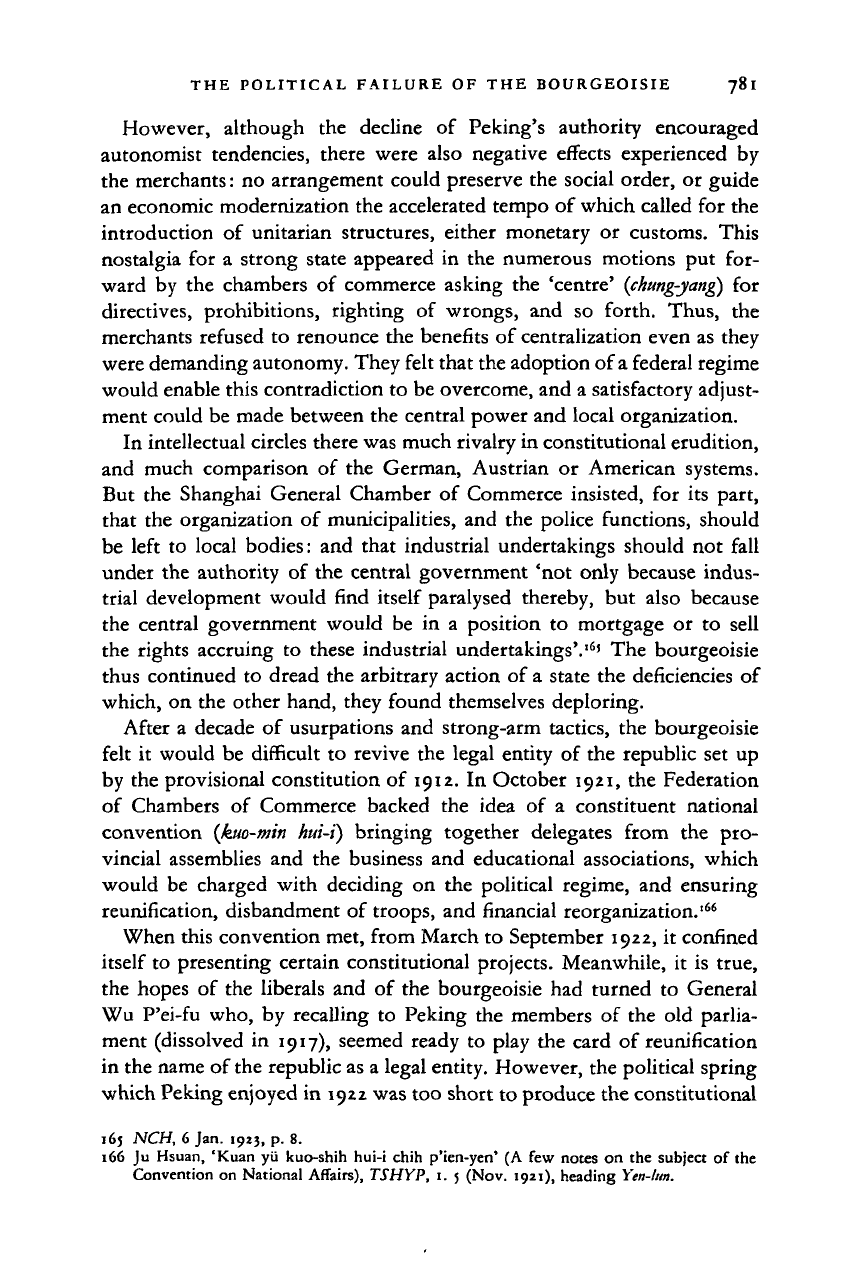
THE POLITICAL FAILURE OF THE BOURGEOISIE 781
However, although
the
decline
of
Peking's authority encouraged
autonomist tendencies, there were also negative effects experienced
by
the merchants:
no
arrangement could preserve
the
social order,
or
guide
an economic modernization
the
accelerated tempo
of
which called
for the
introduction
of
Unitarian structures, either monetary
or
customs. This
nostalgia
for a
strong state appeared
in the
numerous motions
put for-
ward
by the
chambers
of
commerce asking
the
'centre'
(chung-yang)
for
directives, prohibitions, righting
of
wrongs,
and so
forth. Thus,
the
merchants refused
to
renounce
the
benefits
of
centralization even
as
they
were demanding autonomy. They felt that the adoption
of
a
federal regime
would enable this contradiction
to
be overcome, and
a
satisfactory adjust-
ment could
be
made between
the
central power and local organization.
In intellectual circles there was much rivalry in constitutional erudition,
and much comparison
of the
German, Austrian
or
American systems.
But
the
Shanghai General Chamber
of
Commerce insisted,
for its
part,
that
the
organization
of
municipalities,
and the
police functions, should
be left
to
local bodies:
and
that industrial undertakings should
not
fall
under
the
authority
of the
central government
'not
only because indus-
trial development would find itself paralysed thereby,
but
also because
the central government would
be in a
position
to
mortgage
or to
sell
the rights accruing
to
these industrial undertakings'.'
6
'
The
bourgeoisie
thus continued
to
dread
the
arbitrary action
of
a state
the
deficiencies
of
which,
on the
other hand, they found themselves deploring.
After
a
decade
of
usurpations
and
strong-arm tactics,
the
bourgeoisie
felt
it
would
be
difficult
to
revive
the
legal entity
of
the republic
set up
by
the
provisional constitution
of
1912.
In
October 1921,
the
Federation
of Chambers
of
Commerce backed
the
idea
of a
constituent national
convention {kuo-min hui-i) bringing together delegates from
the pro-
vincial assemblies
and the
business
and
educational associations, which
would
be
charged with deciding
on the
political regime,
and
ensuring
reunification, disbandment
of
troops,
and
financial reorganization.'
66
When this convention met, from March
to
September 1922,
it
confined
itself
to
presenting certain constitutional projects. Meanwhile,
it is
true,
the hopes
of the
liberals
and of the
bourgeoisie
had
turned
to
General
Wu P'ei-fu who,
by
recalling
to
Peking
the
members
of the old
parlia-
ment (dissolved
in
1917), seemed ready
to
play
the
card
of
reunification
in the name
of
the republic as
a
legal entity. However, the political spring
which Peking enjoyed
in
1922 was too short
to
produce the constitutional
165
NCH, 6
Jan. 1923,
p. 8.
166
Ju
Hsuan, 'Kuan
yii
kuo-shih hui-i chih p'ien-yen
1
(A few
notes
on the
subject
of the
Convention
on
National Affairs), TSHYP,
1. 5 (Nov.
1921), heading
Yen-Urn.
Cambridge Histories Online © Cambridge University Press, 2008
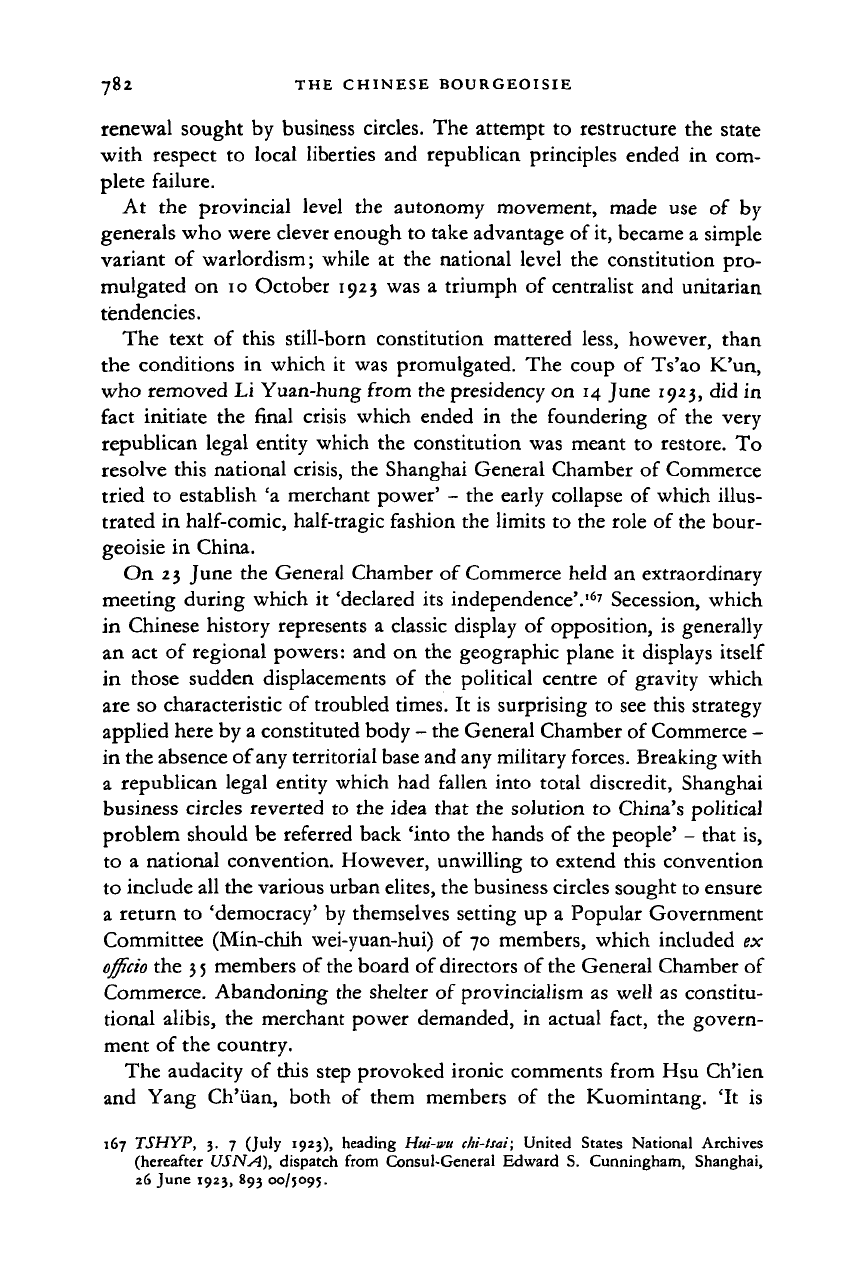
782 THE CHINESE BOURGEOISIE
renewal sought
by
business circles.
The
attempt
to
restructure
the
state
with respect
to
local liberties
and
republican principles ended
in com-
plete failure.
At
the
provincial level
the
autonomy movement, made
use of by
generals who were clever enough
to
take advantage
of
it, became
a
simple
variant
of
warlordism; while
at the
national level
the
constitution
pro-
mulgated
on 10
October 1923
was a
triumph
of
centralist
and
Unitarian
tendencies.
The text
of
this still-born constitution mattered less, however, than
the conditions
in
which
it was
promulgated.
The
coup
of
Ts'ao
K'un,
who removed
Li
Yuan-hung from the presidency
on
14 June 1923, did
in
fact initiate
the
final crisis which ended
in the
foundering
of the
very
republican legal entity which
the
constitution
was
meant
to
restore.
To
resolve this national crisis,
the
Shanghai General Chamber
of
Commerce
tried
to
establish
'a
merchant power'
- the
early collapse
of
which illus-
trated
in
half-comic, half-tragic fashion
the
limits
to the
role
of
the bour-
geoisie
in
China.
On 23 June
the
General Chamber
of
Commerce held
an
extraordinary
meeting during which
it
'declared
its
independence'.'
67
Secession, which
in Chinese history represents
a
classic display
of
opposition,
is
generally
an
act of
regional powers:
and on the
geographic plane
it
displays itself
in those sudden displacements
of the
political centre
of
gravity which
are
so
characteristic
of
troubled times.
It is
surprising
to see
this strategy
applied here by a constituted body
-
the General Chamber
of
Commerce
-
in the absence of any territorial base and any military forces. Breaking with
a republican legal entity which
had
fallen into total discredit, Shanghai
business circles reverted
to the
idea that
the
solution
to
China's political
problem should
be
referred back 'into
the
hands
of
the people'
-
that
is,
to
a
national convention. However, unwilling
to
extend this convention
to include all the various urban elites, the business circles sought to ensure
a return
to
'democracy'
by
themselves setting
up a
Popular Government
Committee (Min-chih wei-yuan-hui)
of 70
members, which included
ex
officio
the
3 5
members
of
the board
of
directors
of
the General Chamber
of
Commerce. Abandoning
the
shelter
of
provincialism
as
well
as
constitu-
tional alibis,
the
merchant power demanded,
in
actual fact,
the
govern-
ment
of
the country.
The audacity
of
this step provoked ironic comments from
Hsu
Ch'ien
and Yang Ch'iian, both
of
them members
of the
Kuomintang.
'It is
167 TSHYP,
3. 7
(July 1923), heading Hui-wu
chi-tsai;
United States National Archives
(hereafter USNA), dispatch from Consul-General Edward
S.
Cunningham, Shanghai,
26 June 1923, 893 00/5095.
Cambridge Histories Online © Cambridge University Press, 2008
